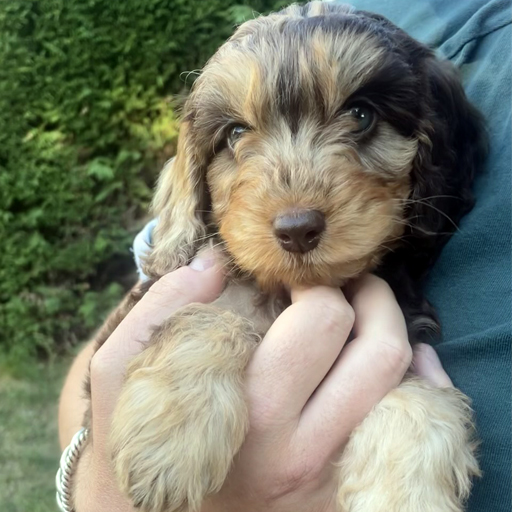Our beloved school dog, a Cockapoo, will join our school community in July 2023 when she is just 8 weeks old. Just like our new learners, she is taking some time to settle in and become familiar with the school environment. During this initial period, she will primarily spend her time in the school office before gradually exploring the school site and getting used to her surroundings.
To ensure our school dog is well-prepared for her role with our learners, she will undergo training once she reaches the age of 1 year. However, before that, she is currently attending puppy training classes with her owners. Until she completes her puppy training, she will not interact with learners on an individual or small group basis.
Once fully trained, our school dog will have the opportunity to visit classrooms and listen to readers from across the school. Sometimes, she may also provide comfort and support to those who are feeling down, as a gentle stroke and a look into her kind eyes can bring happiness to anyone.
Having a school dog offers numerous benefits, including creating a calming effect on learners, particularly those with behavioural or learning difficulties. It also helps improve behaviour, concentration, self-esteem, and encourages participation from more withdrawn learners. Our school dog fosters a sense of responsibility, motivates learners to think and learn, and encourages respect and better relationships among peers, parents, and teachers. Moreover, she teaches learners to nurture and respect life while aiding in building confidence in reading.
We understand that some parents, teachers, and learners may have reservations or uncertainties about dogs. Therefore, we have organised assemblies, social stories, and activities to introduce and familiarise everyone with our new school dog. Learners will be educated on how to interact with a dog and what actions to avoid. Additionally, our dog will be available to work with learners (and adults) who have had negative experiences with dogs or other animals.
With parental permission, learners who react fearfully to dogs will receive support in gradually approaching, handling, and gaining confidence in managing their fear. While our dog’s main place of residence will be a secure office area separate from the classrooms, learners will have supervised interaction with the dog at specific times of the week, as long as parental permission has been granted. The dog will not have unsupervised access to other visitors without mutual consent. It is important to emphasise that we will make every effort to reassure fearful learners, and they will never be forced to meet or interact with the dog if they are uncomfortable.
During her movements within the school, our school dog will always be on a short lead and accompanied by an adult. We specifically chose a Cockapoo as the most suitable breed for our school because of its ideal temperament and wide usage in therapy and support roles, such as hearing dogs. Cockapoos are known for being gentle, friendly creatures, and have been successfully utilised in other schools.
We hope that our school dog will bring joy, comfort, and support to our learners while contributing to their overall well-being and development. If you have any further questions or concerns, please don’t hesitate to reach out to us.


Frequently Asked Questions
The legal owner of the dog is Shane Baker and Jared Furguson who will care for the dog out of school hours and will bear the costs associated with it; the school will not pay for any additional costs that may incur as a result of the dog being in school (for example, training).
Yes. We have researched breeders and have chosen a reputable breeder.
The dog will be kept in the office area. The office is separate from the classrooms/playground area to ensure it only comes into contact with learner who are happy to have contact and have parental permission for this, under strict supervision. We will be careful to ensure that time spent with the school dog is shared among learners fairly. We will also ensure that learners who do not have permission for direct contact with the dog are still able to participate in a number of ways, should they wish to do so
Yes, we have carefully considered having a dog in school and sought advice from many sources, including other schools that successfully have a school dog. The risk assessment is available on the website.
The legal owners of the dog will be responsible for her training. After puppy training at around 1 years old the school dog will undergo appropriate professional training through completing a PAT Pro (Pets As Therapy) assessment.
In the interest of health and hygiene our school dog will be toileted off the school site wherever possible. Adult handlers will ensure that all toileting is cleaned up when nature calls.
The dog will be walked at lunchtimes; parents will be able to give permission in advice to allow their child to be able to walk with a member of staff and the dog during that time. This will also be used as a behaviour reward. The dog will be kept in the Headteacher’s Office and will only have planned supervised contact with learner and visitors. The dog will be carefully trained over a period of time and will have unlimited access to water. We will work closely with other professionals to ensure the dog’s welfare is always carefully considered.
The breed of dog has been chosen for its hypoallergenic properties, however, learners will not need to touch the dog which will relieve the possibility of allergic reactions however small. We already manage a number of allergies at the school and this will be no different for learners and adults that are allergic to dogs. Individual needs will always be met and we are happy to work with parents to put additional control measures in place for individual allergies.
Access to the dog is carefully managed and supervised and learners do not need to have close contact with it unless permission for this has been given. We hope to work closely with parents of learner who are fearful of dogs to alleviate their fear and to teacher them how to manage this.
The dog will be trained not to lick. However, while she is still a puppy and being trained, we will try hard to ensure that learner do not come into contact with saliva, but if they do, we will contact parents as soon as possible to let them know that their child will need to wash before praying.

